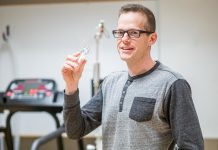April 2006 - A new Joslin Diabetes Center-led study has shown conclusively that two receptors in the insulin-producing beta cell do not affect developmental growth, refuting a long-held hypothesis in diabetes research. This finding is helping scientists in their efforts to isolate the growth factors that do stimulate beta cell growth and understand the defects in insulin production and secretion that cause diabetes.
These two receptors have been a major focus of research on beta cell development as scientists seek to find ways to promote the growth of these essential insulin-producing cells in diabetes patients. This latest research will appear in an upcoming issue of Nature Genetics and is published online on the journal's Web site, http://www.nature.com/ng.
In two previous Joslin studies, insulin receptor, a protein that mediates the action of insulin, and the receptor for insulin-like growth factor I (IGF-I), a hormone, which were suggested as critical for mediating islet/beta cell development and growth, were individually "knocked out" in beta cells in genetically altered mice. Researchers were surprised to discover that the beta cells developed and grew normally without these receptors, according to Rohit N. Kulkarni, M.D., Ph.D., Investigator at Joslin Diabetes Center and Assistant Professor of Medicine at Harvard Medical School, who led the latest study and was lead author in the two previous Joslin studies.
"When you knock out one receptor at a time, the remaining receptor can compensate for the other since both are so similar," says Dr. Kulkarni. "In this study, we knocked out both at the same time and still didn't see a defect in the developmental growth of beta cells. Our conclusion is that there are growth factors and pathways independent of IGF-I and insulin that are necessary for the development of beta cells."
Beta cell function, or lack of it, is critical in both type 1 and type 2 diabetes. Type 1 diabetes occurs when the beta cells in the pancreas are attacked by a malfunctioning immune system, while in type 2 diabetes, the beta cells function but do not produce enough insulin to meet the body's needs or do not respond appropriately to the insulin that is produced. Long viewed as an autoimmune disease, type 1 diabetes may instead be caused by an underlying dysfunction in insulin/IGF-I signaling and increased vulnerability of beta cells to stress during the weaning period, a hypothesis currently being investigated by Dr. Kulkarni's laboratory. Recent research suggests that type 2 diabetes includes a variety of diseases caused by multiple defects in the insulin-production, insulin-signaling and insulin-using system.
Continue Reading Below ↓↓↓
Older studies using traditional techniques did suggest that IGF-I affected beta cell growth. Using more precise genetic engineering techniques, the Joslin studies have revealed that the absence of receptors for IGF-I or insulin don't affect development but do play a critical role in insulin secretion by regulating the glucose-stimulated insulin release from the beta cell. Without the receptors, there were insufficient levels of two proteins -- the enzyme glucokinase and the specific glucose transporter of the beta cell, Glut2 -- instrumental in glucose sensing by the beta cell. The study provides further evidence to explore the role of the insulin receptor in insulin secretion, which may lead to a greater understanding of why beta cells in type 2 diabetes cannot secrete insulin.
In the study, the "knockout" mice without the receptors were born with the same number of beta cells as the control group. At two weeks, however, they had abnormally small mass of beta cells and developed diabetes at three weeks. They died at five to six weeks; the normal mouse lifespan is two years. Compared to the mice that had only one receptor knocked out, these mice developed more severe diabetes.
"Without the activation of proteins necessary for survival provided by the "knocked-out" receptors, the beta cells became susceptible to cell death as the mice aged," says Dr. Kulkarni.
Dr. Kulkarni's laboratory in the Section on Cellular and Molecular Physiology at Joslin is currently conducting experiments using mice that lack both receptors and exploring what growth factors are altered. "It will give us a clue about which growth factors are critical for development of beta cells in the absence of the two receptors," says Dr. Kulkarni. "If we can understand how the beta cells grow, we can think of ways to promote growth that would aid diabetes treatment."
If the exact growth factor is identified, it could be used to promote beta cell growth. Another treatment option is growing beta cells outside the body and transplanting them into patients with type 1 or type 2 diabetes. The body needs a large number of beta cells to function normally.
Other researchers participating in the study include: C. Ronald Kahn, M.D., President of Joslin Diabetes Center and Mary K. Iacocca Professor of Medicine, Harvard Medical School; Kohjiro Ueki, M.D., Ph.D., Terumasa Okada, M.D., Ph.D., Jiang Hu, M.D., Chong Wee Liew, Ph.D., and Anke Assmann, M.D., of Joslin; Gabriella M. Dahlgren, Ph.D., Jennifer L. Peters, Ph.D., Jonathan G. Shackman and Robert T. Kennedy, Ph.D., of the University of Michigan; Min Zhang, Ph.D., and Leslie S. Satin, Ph.D., of the Virginia Commonwealth University Medical Center; Isabella Artner, Ph.D., and Ronald Stein, Ph.D., of Vanderbilt University Medical Center; and Martin Holzenberger, M.D., Ph.D., of the Hopital Saint-Antoine, France. Funding for the study was provided by the National Institutes of Health.
Source: Joslin Diabetes Center











